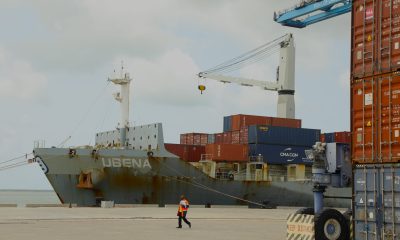Investigations
EXCLUSIVE: British American Tobacco Kenya Exposed Over Missing Sh9.6 Billion in Tax Evasion
New research has revealed evidence suggesting British American Tobacco Kenya (BATK) may have avoided or evaded up to Sh9.6 billion in profit taxes in Kenya.

A damning report by the University of Bath’s Tobacco Control Research Group (TCRG) and Tax Justice Network Africa has uncovered a $93 million (KES 9.6 billion) discrepancy in the financial disclosures of British American Tobacco Kenya (BATK) for 2017 and 2018.
The findings, which suggest potential tax avoidance or evasion, have raised urgent questions about the company’s financial practices and prompted calls for a thorough investigation by Kenyan authorities.
The report, published in collaboration with The Investigative Desk, analyzed six years of BATK’s annual reports, production data submitted to the Kenya Revenue Authority (KRA), government documents, and cigarette consumption and pricing data. It revealed glaring inconsistencies, including millions of unaccounted cigarette packs, which could translate into significant unpaid taxes.
Unanswered Questions and Calls for Accountability
Tax and audit experts who reviewed the findings have called for immediate action. Leopoldo Parada, Reader in Tax Law at King’s College London, stated, “In the absence of a convincing explanation, this looks like tax avoidance and potentially evasion.” Kennedy Waituika, Director of Audit and Assurance at TradeMark Africa, echoed this sentiment, urging the KRA to conduct a comprehensive tax review of BATK.
Despite the mounting evidence, BAT Kenya has denied any wrongdoing. In a statement, a company spokesperson said, “BAT Kenya firmly rejects all the allegations made regarding the discrepancy between its published financial disclosures and data. The company pays all taxes in line with applicable laws.” However, the report’s authors have criticized the company for failing to provide a credible explanation for the discrepancies.
Despite multiple inquiries,BATK refused to disclose additional financial records, citing “commercial confidentiality.”
The Kenya Revenue Authority has yet to respond to requests for comment on whether it will investigate the matter. This silence has fueled concerns about the effectiveness of tax enforcement in Kenya, particularly in relation to multinational corporations.
A Pattern of Exploitation?
The investigation reveals BATK operates within a highly convoluted corporate structure, with financial flows passing through opaque subsidiaries in Kenya, the Netherlands, and the UK. This intricate web appears designed to minimize tax liabilities.
For instance, the Dutch entity Molensteegh Invest BV—which owns 60% of BATK—funnels millions of dollars in dividends to BAT’s UK headquarters while reporting minimal local profits. This model, according to experts, is a textbook case of aggressive tax planning, allowing the company to reduce its taxable income in Kenya.
Such strategies are not unique to Kenya. BAT has been found guilty of tax evasion in the Netherlands, where courts ruled that the company deliberately excluded 1.8 billion EUR in profits from tax authorities. Similarly, in South Africa, the company faced a 152 million USD tax dispute, which was settled under undisclosed terms.
Andy Rowell of TCRG highlighted the colonial legacy of profiting from African markets while evading responsibilities. “If this is happening in Kenya, it begs the question of whether similar practices are occurring in other jurisdictions, including the UK and the US,” he said.
Dr. Rob Branston, also from TCRG, emphasized the need for stronger regulation and enforcement. “Transnational corporations like BAT Kenya have a duty to pay their fair share of taxes, especially in countries where they profit significantly. This is a stark reminder of the need to prevent companies from exploiting tax systems to the detriment of public resources and development,” he said.
A History of Controversy
This report builds on earlier investigations, including the 2020 publication Big Tobacco, Big Avoidance, which exposed widespread tax avoidance practices by transnational tobacco companies. Marcel Metze of The Investigative Desk, who has spent years investigating the tax practices of major tobacco corporations, noted, “We keep finding lack of transparency, opaque fiscal structures, and consistent tax planning practices which can be labelled as ‘aggressive.’ The results of our study raise serious doubt about the correctness of the company’s financial reporting.”
The allegations against BAT Kenya are not isolated. In 2017, the UK’s Serious Fraud Office (SFO) launched an investigation into BAT over allegations of bribery and corruption in Africa. Although the investigation was closed in 2021, Bob Blackman MP, Co-Chair of the All-Party Parliamentary Group on Smoking and Health, has called for the SFO to reopen its probe in light of the new evidence. “This newly published research raises serious questions about British American Tobacco’s activities in Kenya,” he said.
Implications for Kenya and Beyond
The $93 million discrepancy represents a significant loss of revenue for Kenya, a country where public resources are already stretched thin. Tax evasion by multinational corporations not only undermines government budgets but also exacerbates inequality and hampers development efforts.
The report’s authors and experts are urging Kenyan authorities to take swift action. They also hope the findings will prompt similar investigations in other countries where BAT and other tobacco companies operate. As Marcel Metze put it, “The results of our study warrant further investigation by financial authorities.”
For now, the spotlight remains on BAT Kenya and the KRA. Will the company provide a credible explanation for the discrepancies? Will the KRA step up to hold a powerful multinational accountable? The answers to these questions could have far-reaching implications for tax justice in Kenya and beyond.
Missing_millions_report_tobacco_control_research_group_Feb_2025Kenya Insights allows guest blogging, if you want to be published on Kenya’s most authoritative and accurate blog, have an expose, news TIPS, story angles, human interest stories, drop us an email on [email protected] or via Telegram
-

 Grapevine1 week ago
Grapevine1 week agoRussian Man’s Secret Sex Recordings Ignite Fury as Questions Mount Over Consent and Easy Pick-Ups in Nairobi
-

 News6 days ago
News6 days agoTHE FIRM IN THE DOCK: How Kaplan and Stratton Became the Most Scrutinised Law Firm in Kenya
-

 Investigations1 week ago
Investigations1 week agoMulti-Million Dollar Fraud: Three Kenyans Face US Extradition in Massive Cybercrime Conspiracy
-

 Economy6 days ago
Economy6 days agoIran Demands Arrest, Prosecution Of Kenya’s Cup of Joe Director Director Over Sh2.6 Billion Tea Fraud
-

 Business7 days ago
Business7 days agoA Farm in Kenya’s Rift Valley Ignites a National Reckoning With Israeli Investment
-

 Africa1 week ago
Africa1 week agoFBI Investigates Congresswoman Ilhan Omar’s Husband’s Sh3.8 Billion Businesses in Kenya, Somalia and Dubai
-

 Business2 weeks ago
Business2 weeks agoM-Gas Pursues Carbon Credit Billions as Koko Networks Wreckage Exposes Market’s Dark Underbelly
-

 Arts & Culture1 week ago
Arts & Culture1 week agoWhen Lent and Ramadan Meet: Christians and Muslims Start Their Fasting Season Together




























